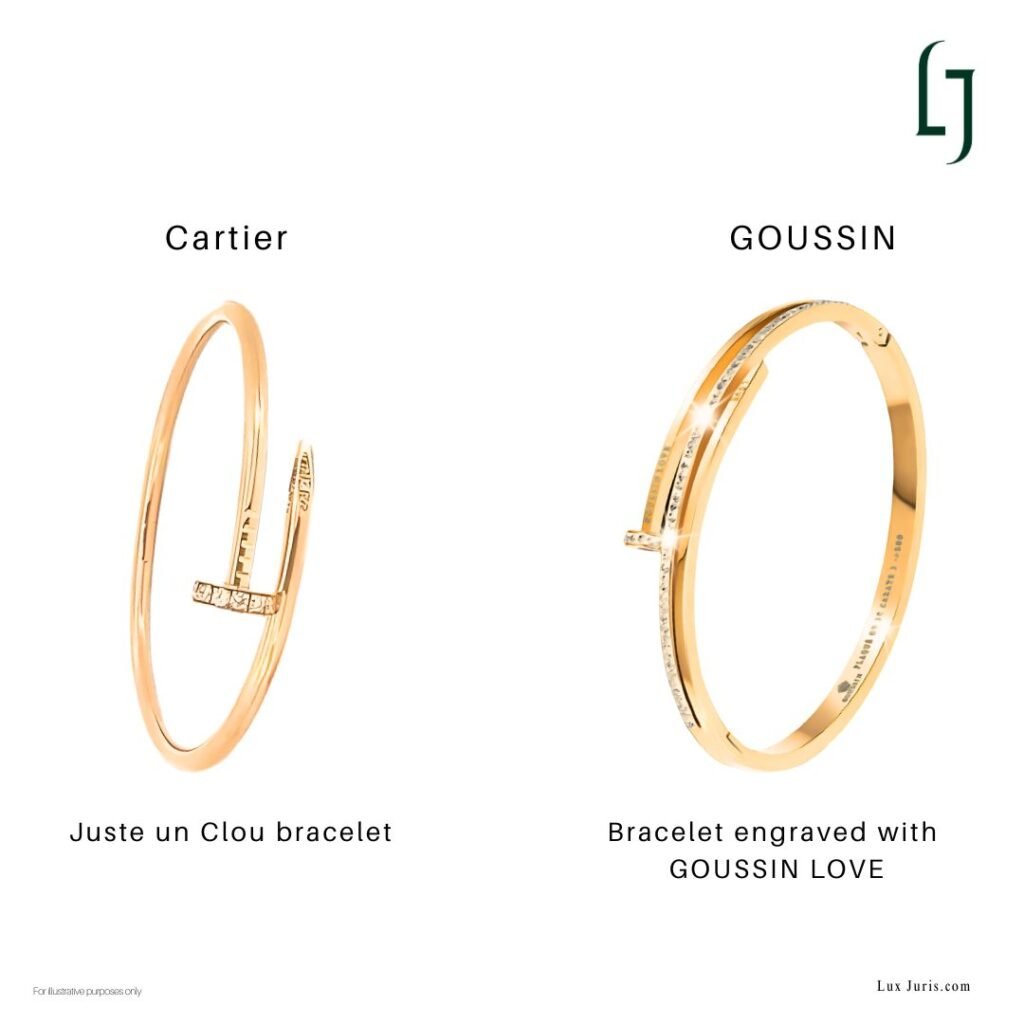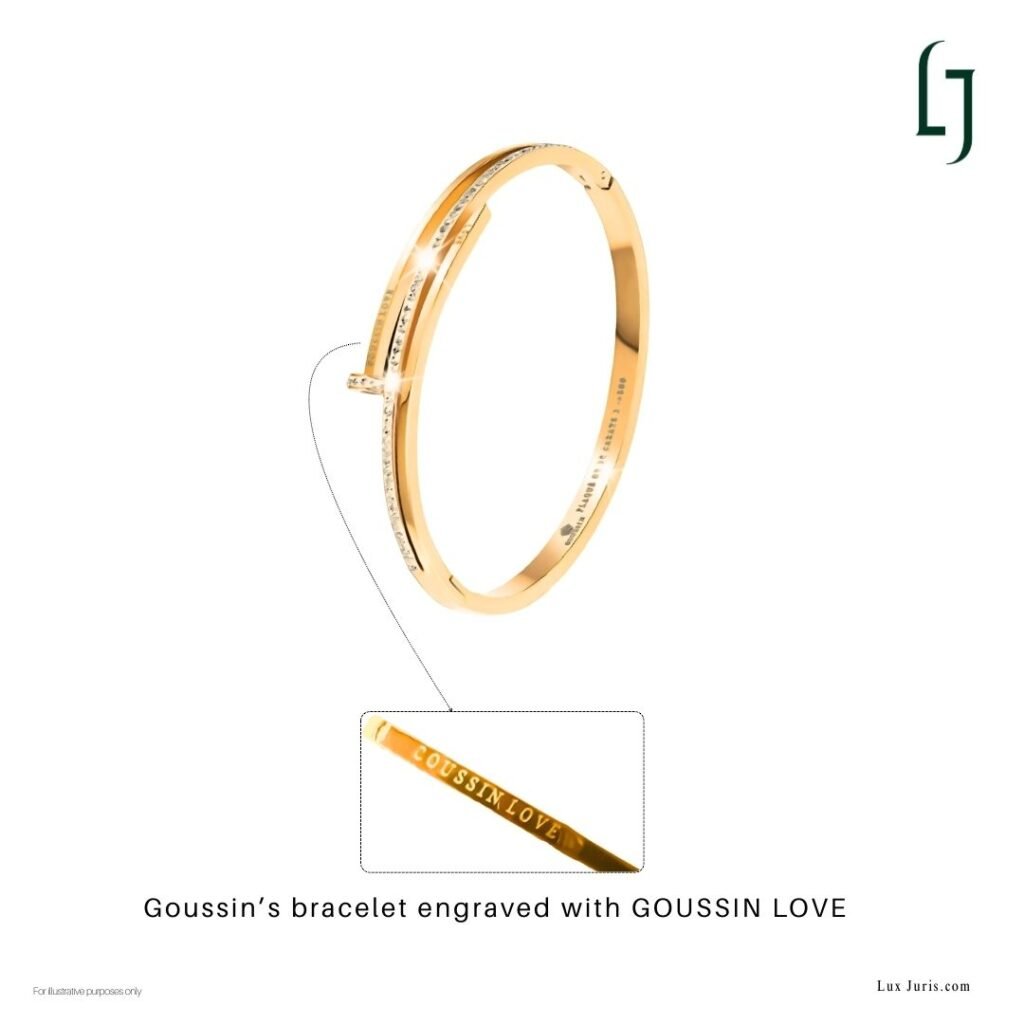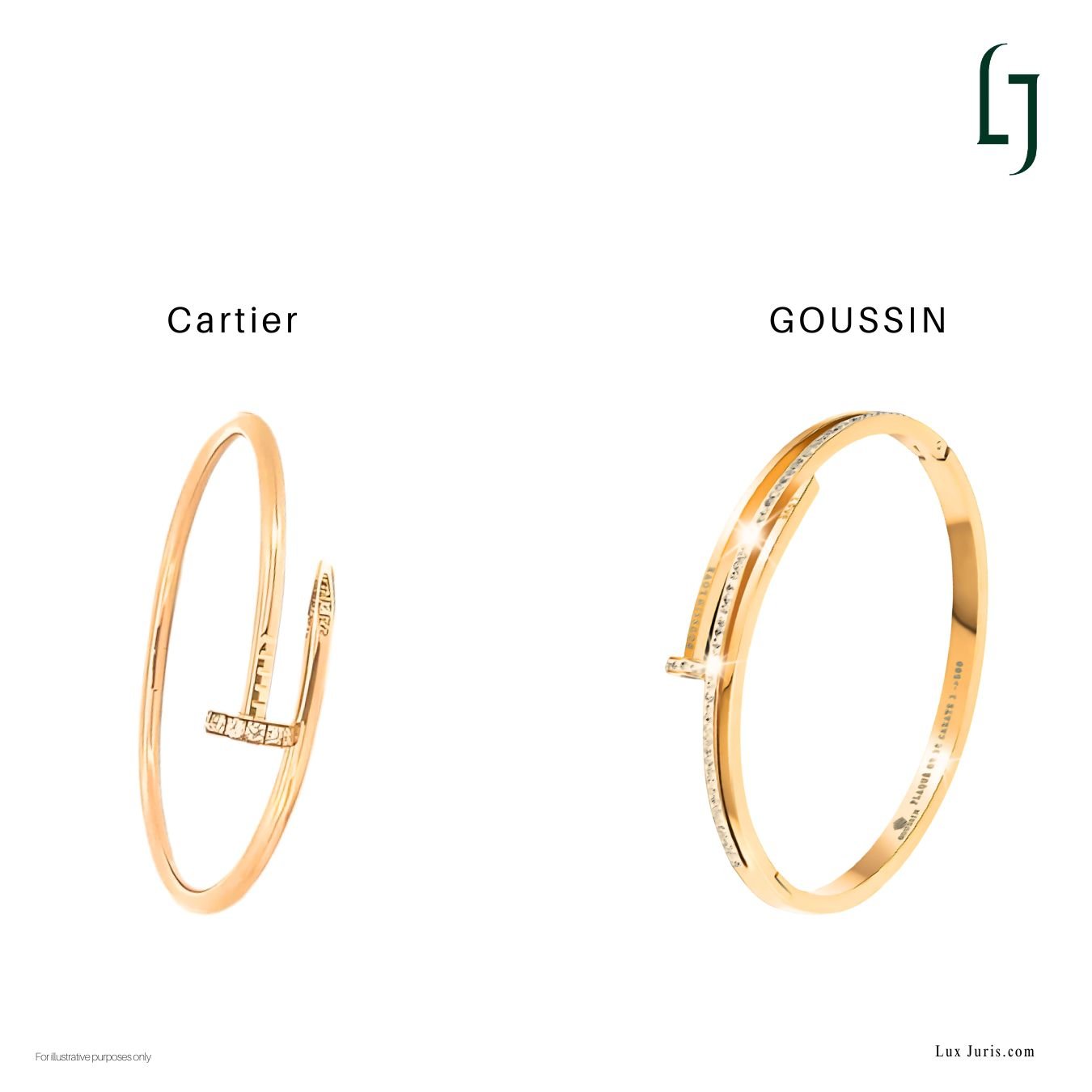On 5 March 2025 the Paris Judicial Court (Tribunal judiciaire de Paris) gave judgment in a dispute between Cartier International AG and Société Cartier on one side and the British companies Goussin Ltd and Goussin Jeweler Ltd on the other. The case concerned the sale of bracelets marketed under the name LOVE. Cartier said these sales infringed its trademarks and misled the public through unfair competition.
The LOVE bracelet has long been one of Cartier’s most recognisable pieces. Cartier argued that Goussin’s use of the word LOVE, both as a product name and engraved on the jewellery, amounted to direct appropriation of its marks. It also challenged Goussin’s claims that its products were patented, gold plated, French made and handmade, as well as its online marketing which linked the bracelets to Cartier designs. The case therefore combined trademark infringement with allegations of misleading commercial behaviour.
The parties and the marks
Cartier International owns two French trademarks. The first is the word mark LOVE, registered in 1974 and renewed in 2014, covering bracelets. The second is the semi figurative LOVE mark, registered in 2007 and renewed in 2017, which features stylised letters that resemble screws. Société Cartier, the French company, manages the exploitation of these marks in France.
Goussin is a British jewellery business that operated the websites goussin.fr and goussin.com. Goussin Jeweler, a related company, was dissolved in July 2023 after proceedings had begun.
The background
In December 2021 Cartier discovered that Goussin was selling bracelets under the name LOVE. Some of the bracelets were engraved with LOVE while others bore the inscription GOUSSIN LOVE. Cartier sent a cease and desist letter on 13 December 2021 but received no response. In September 2022 it started proceedings in Paris for trademark infringement and unfair competition. The case was heard in December 2024 and judgment was issued in March 2025.
Cartier’s claims
Cartier argued that the use of LOVE by Goussin was not decorative but a way of identifying and promoting a product line. It claimed that this reproduced its word mark and imitated its semi figurative mark, creating a risk of confusion even with the addition of GOUSSIN. Cartier asked the court to stop Goussin from using the sign, to order disclosure of its suppliers and distributors, to award 48,000 euros in damages based on a royalty rate, and to grant 50,000 euros for moral harm caused by dilution of its marks.
On unfair competition Cartier said that Goussin created confusion by promoting its LOVE bracelet next to an authentic Cartier LOVE bracelet on Pinterest and by marketing a bracelet that copied Cartier’s Juste un Clou design. It said Goussin falsely claimed that its bracelets were patented in France, plated in 18 carat gold, made in France and handmade. In reality, the products were sourced from China and not proven to be handmade. Cartier also pointed to breaches of French e-commerce law as Goussin’s websites did not provide required host information. Cartier asked for damages, including compensation for Société Cartier as the French exploitant of the marks, and for publication of the judgment in the press, on Goussin’s websites and on its social media.
Goussin’s defence
Goussin said that LOVE is a common word used as a message of affection, not as a trademark. It argued that GOUSSIN LOVE clearly identified its brand and avoided confusion, and that Cartier had not shown that the LOVE marks were renowned. It added that there could be no confusion because Goussin’s bracelets were sold at lower prices through different channels.
On unfair competition Goussin said that Société Cartier had not proved it was exploiting the marks in France before November 2022, which was later than the acts in question. It claimed that its bracelet inspired by Juste un Clou was lawful because the design was not protected and the products were not identical. It argued that its statements about patents, gold plating and origin caused no prejudice because Cartier operates in a different market. On the website issue it said that Shopify was identified as host and that further details were easy to find. Goussin also accused Cartier of pursuing an abusive procedure, especially against Goussin Jeweler, and asked for damages and costs.
The court’s findings on trademark infringement
The court ruled that Goussin had used LOVE as a trademark and not as decoration. The fact that its other bracelets were sold under names such as Mykonos or Cote d’Azur showed that LOVE was used as a product name. The engraving GOUSSIN LOVE confirmed this.

The court found that reproduction of the word mark LOVE was proven, and that the semi figurative mark was also infringed because of strong similarities in sound, concept and appearance. It considered that confusion could arise even though the bracelets were cheaper and sold in different ways.
The court’s findings on unfair competition
The tribunal treated Cartier International and Société Cartier separately. It rejected the claims of Société Cartier because it had only proved exploitation of the marks in France from November 2022, which was too late to cover the disputed period. Cartier International’s claims were accepted.

The court found that Goussin’s bracelet copied the Juste un Clou design, that its Pinterest post associated its products with Cartier, and that its claims of patents, gold plating, French origin and handmade production were false. It also found that the failure to provide proper host information was a breach of law that gave Goussin an unfair advantage.
Relief granted
The court prohibited Goussin from using LOVE on bracelets in France, subject to a penalty of 100 euros per day for non compliance. It ordered Goussin to disclose information on suppliers and distributors under penalty. It awarded Cartier International 10,950 euros for trademark infringement, based on a 15 percent royalty applied to Goussin’s turnover of 73,000 euros. It also awarded 8,000 euros for moral harm from dilution of its marks and 5,000 euros for moral harm from unfair competition.
The court rejected Société Cartier’s claims, refused Cartier’s request for publication of the judgment, and dismissed the claim by Goussin Jeweler for abusive procedure. Goussin was ordered to pay the costs of the case and to make an additional payment of 8,000 euros to Cartier.
Conclusion
The decision shows that even simple words, once registered and used as trademarks, are protected when used by others for the same type of product. It also makes clear that false claims about origin, quality or certification amount to unfair competition, regardless of whether the products are sold in a lower price range than luxury goods. Cartier obtained damages and injunctions against Goussin, while Société Cartier’s claims were dismissed because it had not proved exploitation of the marks in France during the period of the acts.
Source:
